Early Bird Deadline
30 November 2025
Judging
Date
23 & 24 March 2026
Winners Announcement
22 April 2026
30 November 2025
23 & 24 March 2026
22 April 2026
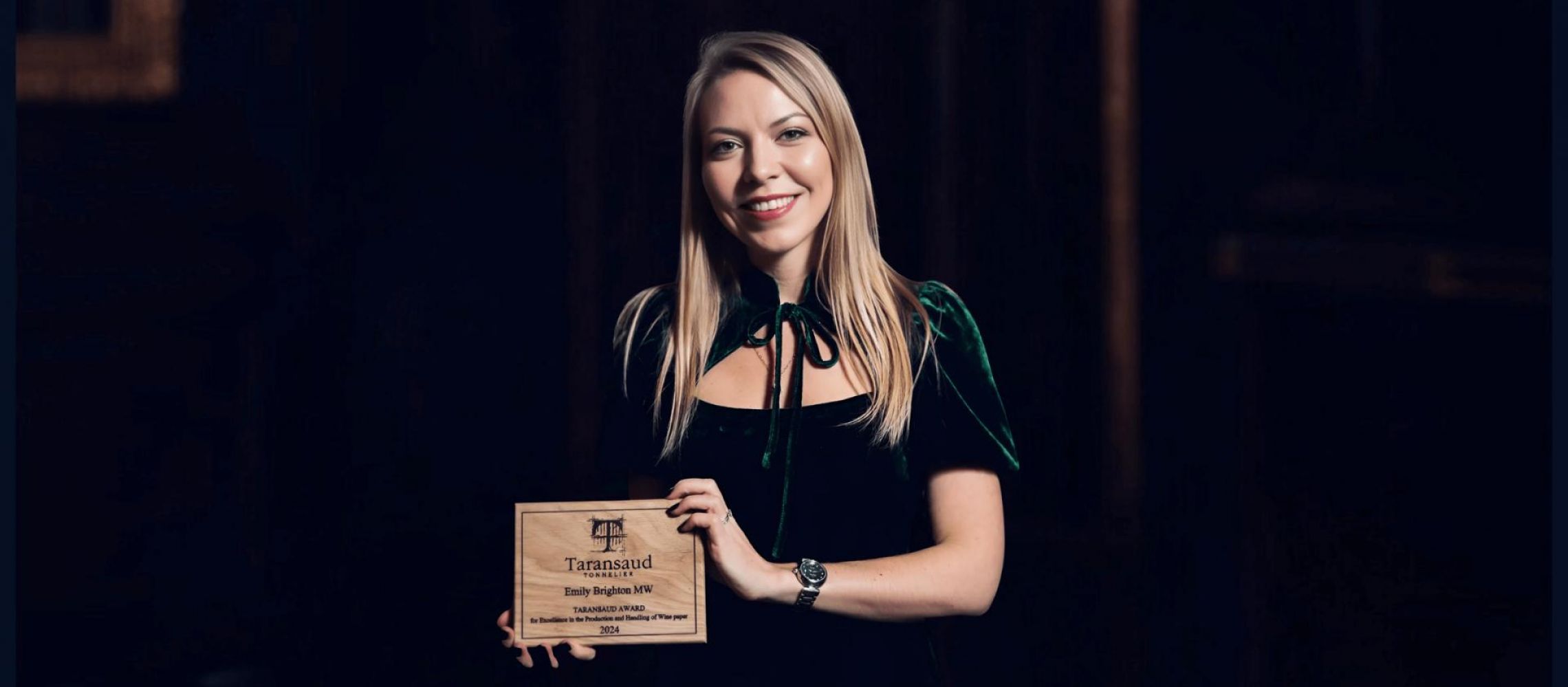
As the youngest female Master of Wine, Emily Brighton brings a distinctive blend of technical expertise, sensory precision, and strategic insight to her role as Head of Technical at North South Wines. In an industry where consumer demands and environmental imperatives evolve rapidly, her leadership helps shape North South Wines’ dynamic wine portfolio. From championing innovative styles and sustainable practices to curating wines that meet both quality benchmarks and market trends, Emily’s approach is rooted in collaboration, transparency, and an acute understanding of wine’s global identity. In this conversation, she shares her journey, her perspective on key industry trends, and her vision for aligning commercial goals with sustainability.
A big part of the MW blind tasting paper is assessing quality and commercial potential i.e. really reading the whole identity of wine and where it would fit into the market, from entry-level to super premium – so that experience has been very beneficial for identifying yes beautifully refined, complex and harmonious wines, but also for spotting wines which are really well-made and good value examples of their variety or origin – this is crucial when it comes to deciding which of various prospective producers from a region are right for North South Wines and its customers, and how our current wines stack up against our competitors during benchmarking exercises, for example.
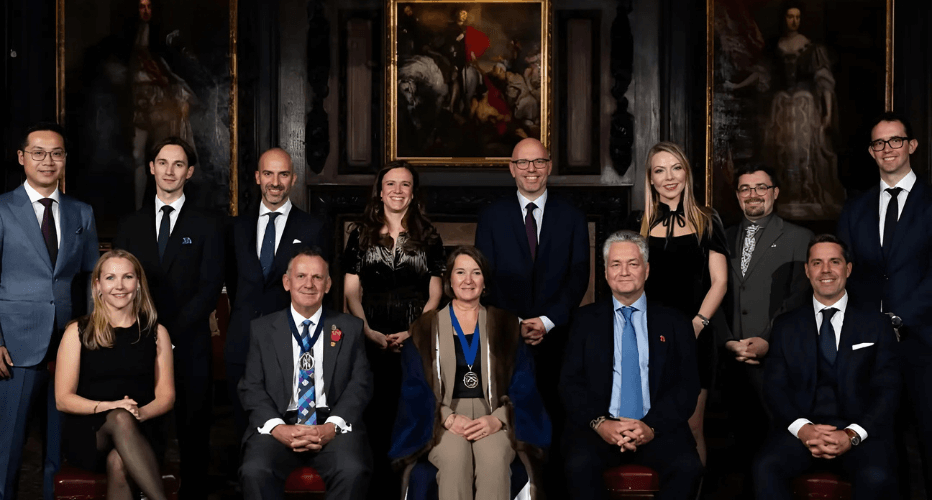
Image: Emily Brighton MW officially being welcomed to the Masters of Wine membership; Source: North South Wines
At North South we seek to work with producers who share our values and vision when it comes to looking after the environment and their workers and communities, a must in 2024 and with our B Corp certification. Good quality liquid at realistic pricing is obviously essential – we have built a really strong core portfolio of brands over the last 10 years so we need to be confident that our sales team will be able to really get behind any new producer we take on and that they offer something interesting for a competitive and crowded market.
It is also really important that wineries want to work collaboratively and proactively with us, and that we can build a long-term partnership, so we will put a lot of effort into doing our due diligence to find the right fit (and make sure we like the people!), such as when we went out to Rioja last week to look for a major brand we could represent.
We are building a reputation for being very responsive to market needs and strive to be a go-to ‘one-stop shop’ for our customers. Whilst we have curated a portfolio that covers almost all key wine styles, regions, and price points, we also have the capabilities to be proactive and dynamic when it comes to sourcing outside of that to meet customer demands, whether in bulk or niche grape varieties etcetera., which helps us stand out and makes our customers’ lives easier.
Our buying, sales, and marketing teams work collaboratively to make sure we have a solid grasp of what are the current trends, what’s on the shelf, and where are the gaps, which enables us to present products of relevance to our customers, whether that is innovative packaging, lower alcohol or an ‘emerging’ region. For example, at the moment we are working on sourcing wine for a new Greek brand we have designed ourselves, because the category is in 200+% growth due to the ‘postcard effect’ of British holidaymakers, and we felt much of what is currently on the shelf is not super appealing for the consumer.
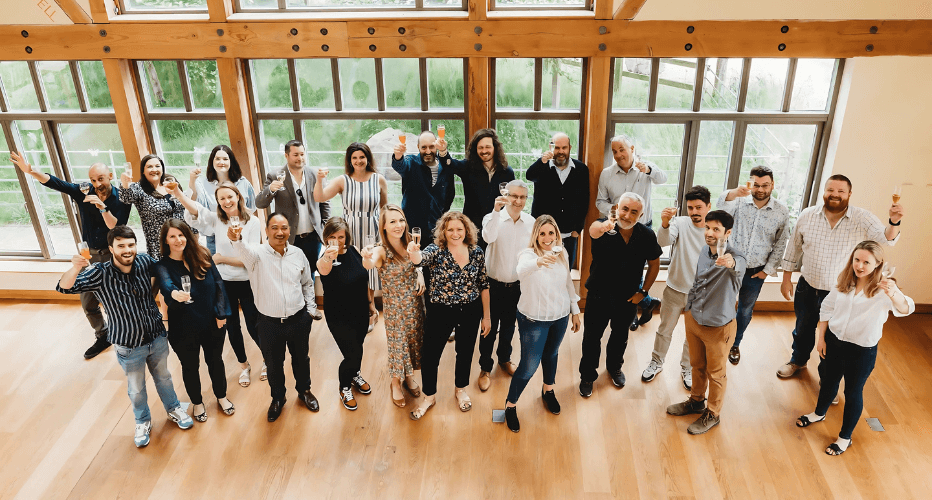
Image: The Team of North South Wines; Source: NSW.
We have championed lo/no alcohol products for many years now, particularly on the sparkling front, which is an area experiencing significant growth, albeit from a low base, as wine consumers seek to moderate their intake but alternating alcoholic and non-alcoholic beverages. Now with the new duty regime, there is also emerging interest in the 8-11% abv bracket for still wines – the challenge is how to make a drinkable, vinous product that consumers will love, and where the lack of or reduction in alcohol is not overall detrimental to the style – this means choosing certain grape varieties with high dry extract but that produce wines which are naturally lower in alcohol, and pétillant styles that will offer some texture, so taking the alcohol down a few degrees on Vinho Verde works really well for example.
We actually tend not to be overly trend-led – whilst we see success bringing ‘niche’ products to market (like our sparkling chillable red from our Australian shareholder, De Bortoli), our focus is on quality and value and trying to lead from the front in the regions where we have strong producers, like Sicily and Puglia, via our Italian shareholder, The Wine People.
Environmental considerations are also, quite rightly, becoming extremely important in the market, so we are always looking to reduce bottle weights and increasingly ship in bulk where viable. We have just calculated our Scope 1-3 emissions and glass looks to constitute about 60% of our carbon footprint, so that is a key area to tackle.
We are very strategic about taking on new producer brands, only where there is a clear commercial rationale, and with a long-term view. This means we tend to only launch a few new brands each year, to make sure they are really well thought-out and supported and resonate with our sales teams. This also means we rarely have to delist products or brands unless we feel they are not working for the UK market, or the commercial context has changed.
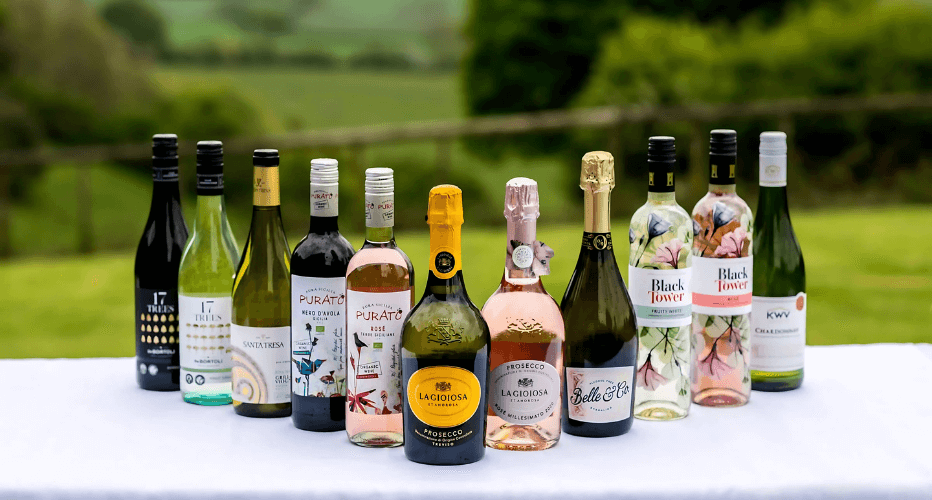
Image: Some wines from the North South Wines portfolio; Source - North South Wines.
As part of our supplier onboarding, we have a comprehensive supplier sustainability screening questionnaire which gives us an overview of alignment in this area and a template for how we can work with them – our Sustainability Manager will then agree on annual targets with each of our suppliers and it’s a very collaborative relationship to share knowledge and identify areas of improvement.
Most of our suppliers have some kind of environmental or social accreditation, and several have now become B Corps themselves, like our Cava producer, Vallformosa, or are following the B Corp framework, like De Bortoli.
Technical considerations are more important than ever as retailers and consumers demand greater due diligence and visibility on the products they are buying, to ensure product quality, safety, integrity, and authenticity throughout the chain of supply.
This, as well as some major retailers making it a requirement in order to supply own-label products, are some of the main reasons we decided to go for the BRCGS Agents & Brokers accreditation, first becoming certified in 2021 with the highest AA grade, which we have maintained in annual audits since, which really signposts that we have robust quality management systems in place.
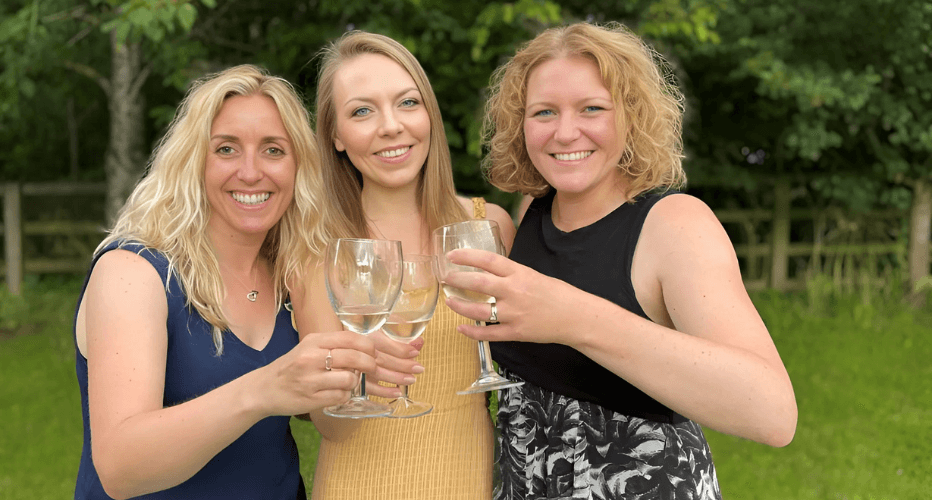
Image: (From Left to Right): Kim Wilson - Founder & Managing Director, Emily Brighton MW - Head of Technical and Rebecca Murphy - Sustainability Manager at B Corp Certified NORTH SOUTH WINES LIMITED. Source: NSW.
From studying the MW programme, you realise how global and mature the UK market really is compared to most other markets in the world. While data shows Sauvignon Blanc and Malbec are still the stalwart grapes for many consumers, overall the UK market is more diverse than ever in terms of styles, regions, and varieties, with renewed interest in indigenous varieties and ‘undiscovered’ regions even in the multiple retailers and discounters, where the majority of wine consumers shop.
Given our average bottle price hovers around £6, it is inevitable that many regions are going to be underrepresented, but there is a lot of value to be found in countries like South Africa and Chile, and also Central and Eastern Europe, which I don’t feel have been fully tapped.
I also think gatekeepers could be more proactive in promoting sustainable packaging formats like we see in the Nordic monopolies.
[[relatedPurchasesItems-38]]
It has fundamentally changed the way we work – B Corp provides a fantastic framework to measure and improve your impact as a business across the 5-Pillars (Workers, Environment, Governance, Customers, Community) – it means that sustainable considerations are genuinely prioritised in all decision making at all levels of the business – it’s not a tick-box exercise and we will be re-certifying in 2025, with a target of getting as close as possible to 100 points, so there is definitely a culture of continuous improvement, and we will also be getting ISO 14001 certified next year.
I actually wrote my MW Research Paper on the impact of B Corp certification on North South Wines as a case study, since we were the first UK wine distributor to gain B Corp status, so that has been a valuable piece of work for similar businesses’ considering going down the B Corp route.
At the start of the process, we created a new Sustainability Manager role to spearhead and coordinate our preparations, and it required buy-in from all our suppliers and stakeholders – a number of employees were also assigned projects, so it really was a huge team effort.
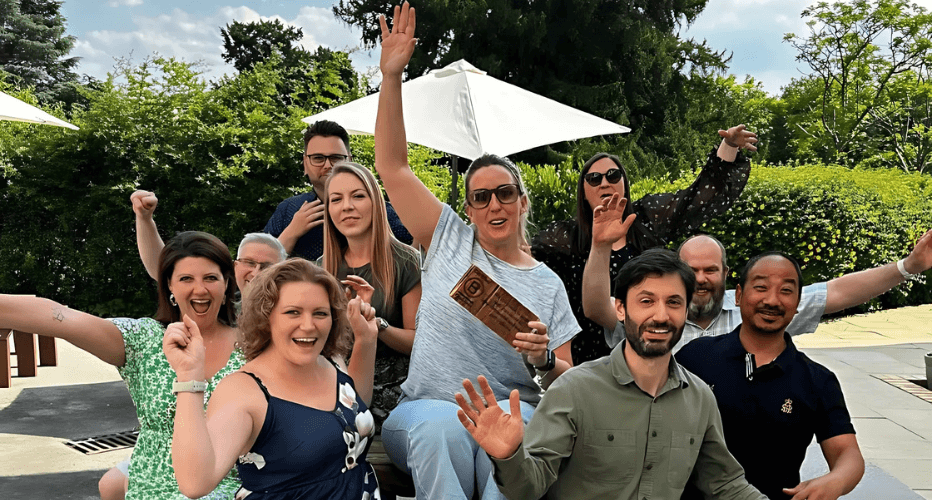
Image: North South Wines certified as a B Corp in 2023. Source: North South Wines.
As well as being diligent and dedicated, to be curious and proactive, ask questions, and seize opportunities - try to find role models or peers or colleagues that will support you and help expand your network.
This can be difficult and daunting, but I would recommend joining Queena Wong’s Curious Vines community – there is a weekly newsletter with numerous updates and regular events which are a great way of meeting other females across the industry, sharing knowledge, and generally uplifting women personally and professionally.
I think also equipping yourself with knowledge by pursuing WSET qualifications (and even the MW if the 10% pass rate doesn’t put you off!) can only build confidence – I hear a lot of women talking about ‘imposter syndrome’, but I think it can be re-framed constructively because pushing yourself out of your comfort zone is where you’ll find growth and develop self-belief, and if you work hard and be resourceful you’ll figure it out, and it won’t seem so scary the next time around!
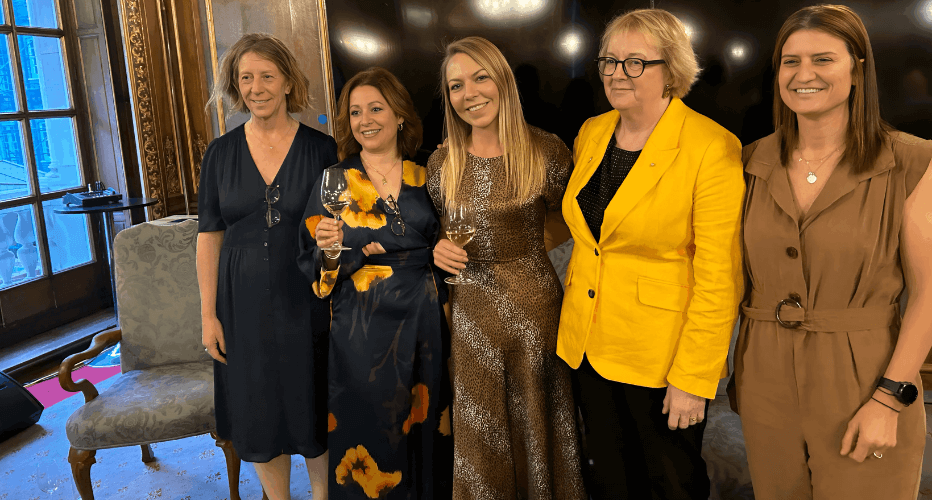
Image: Emily moderating the event Spain Influenced by Pioneering Women - Celebrating Their Impact hosted by Queen Wong of Curious Vines.
Emily Brighton MW plays a pivotal role at North South Wines, leveraging her technical expertise and MW training to enhance the portfolio's quality, sustainability, and market relevance. Her leadership ensures that the company remains at the forefront of the industry, aligning with customer needs while fostering long-term, values-driven partnerships with producers. From curating innovative products to driving sustainability initiatives, Emily’s work embodies North South Wines’ commitment to delivering exceptional and ethically produced wines.
In conversation with Malvika Patel, Editor and VP, Beverage Trade Network
Also Read:
Championing Change: Queena Wong’s Impact on the Wine Industry
Good Times from a Good Place at Pernod Ricard
Jamie Knee Joins as Regional and Category Ambassador For Santa Barbara Wine Country, Rioja and Cava
Make your wines stand out on the world stage. Enter the London Wine Competition by November 30 to secure Early Bird savings.